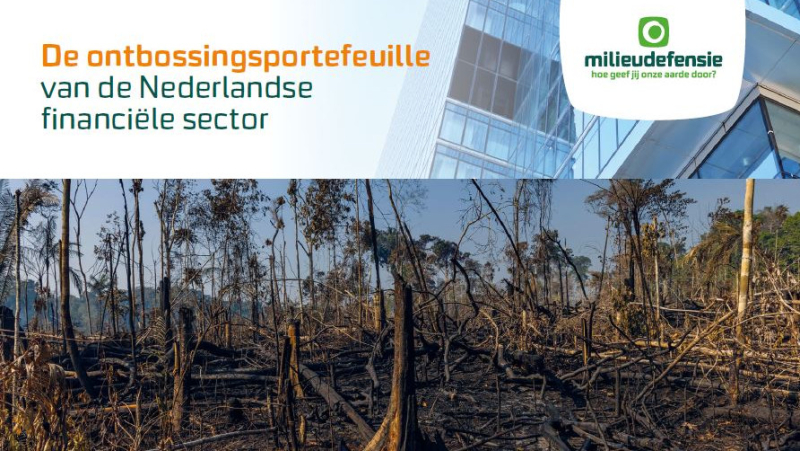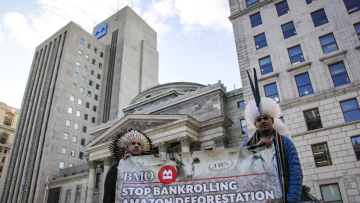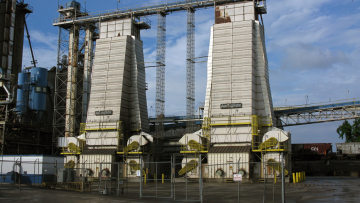Dutch financial sector European frontrunner in financing deforestation
Friends of the Earth Netherlands press centre: Benjamin van Sterkenburg: +31 6 5268 2416

Friends of the Earth Netherlands press centre: Benjamin van Sterkenburg: +31 6 5268 2416
ING, Rabobank and ABN AMRO have provided credit worth €3.1 billion over the past 5 years for commodities that often result in deforestation, such as soy. At the end of 2020, pension funds, insurance companies and banks had investments totalling €362 million in these commodities. This came to light as the result of research carried out by Friends of the Earth Netherlands and Profundo. Dutch financial institutions also invest in companies such as the agribusiness and soy trading company, Bunge, which has repeatedly been linked to deforestation and human rights violations. Friends of the Earth Netherlands wants rules for financial institutions to ban climate damage, including deforestation from their portfolios.
“The Dutch financial sector is the European champion of financing deforestation,” notes Wouter Kolk of Friends of the Earth Netherlands. “In the midst of a climate and biodiversity crisis, we’re putting our money into exacerbating it and adding fuel to the fire! It’s the world upside down. A legal obligation must be introduced that will require financial institutions to have climate-proof, deforestation-free portfolios.”
Money flows to deforestation
Friends of the Earth Netherlands and Profundo examined the money flows between Dutch financial institutions and companies that deal in commodities that have a high risk of tropical deforestation: palm oil, beef, pulp and paper, soy, rubber, cocoa and coffee. ING, Rabobank and ABN AMRO provided credit worth €3.1 billion attributable to these goods between 2016 and 2021, two-thirds of which was to palm oil and soy. At the end of 2020, pension funds, insurance companies and banks had investments in these six commodities totalling €362 million, three-quarters of which was in beef and palm oil.
The Netherlands is the European frontrunner in financing deforestation
The study reveals that there is no financial sector in Europe that is pumping more money into these deforestation-risk commodities than the Dutch. Worldwide, Dutch banks, insurers and pension funds are the third largest investors in beef behind only China and the United States, and the most important investors in soy. ING and Rabobank appear among the international top ten financial institutions investing in soy.
ABP and PFZW are far from sustainable
Dutch pension funds ABP and PFZW together had investments of over €100 million in the Brazilian meat producer JBS at the end of 2020, even though JBS was still buying livestock from farms where illegal deforestation had occurred. This was why Dutch pension funds PMT and PME stopped investing in JBS and other Brazilian meat producers. ING, ABN AMRO and Rabobank have provided more than €120 millions of credit over the past five years to the soy and palm oil company Bunge, which has been associated with human rights violations against land and environmental defenders and the deforestation of 60,000 hectares in Brazil, an issue which was recently reported on by Friends of the Earth Netherlands and the investigative journalism TV program Zembla.
Wouter Kolk, Friends of the Earth Netherlands: “The approach of making financial flows more sustainable by means of voluntary commitments and policies is failing. While deforestation in Brazil has reached its highest level in 15 years, Dutch banks and pension funds continue to invest millions in the companies that profit from this devastation. ABP’s decision to withdraw from fossil fuels was an important step, but to become a true climate leader, the fund must also cut its investments in companies linked to deforestation.”
Legal obligation to ban deforestation from portfolios
Friends of the Earth Netherlands wants the Dutch government to introduce rules for financial institutions, to ban climate damage such as deforestation from their portfolios.
Background:
- The full Friends of the Earth Netherlands report can be found here; English version can be found here
- Financial institutions were given the opportunity to respond to the financial relationships highlighted in the report prior to publication, and those responses have been included in the Friends of the Earth Netherlands report where appropriate
- The background report including the analysis by Profundo can be found here
- Friends of the Earth Netherlands’ research into the soy trade can be found here
- The figures in this press release have been adjusted to the share of the loans and investments in the companies surveyed that can be attributed to commodities with a high risk of tropical deforestation.


